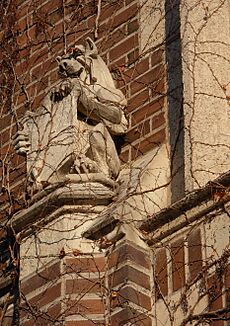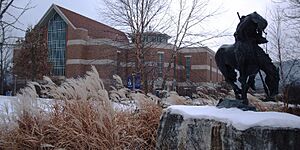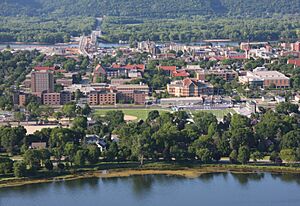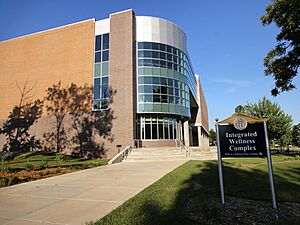Winona State University facts for kids
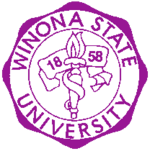 |
|
|
Former names
|
First State Normal School of Minnesota (1858–1873) Winona Normal School (1873–1921) Winona State Teachers' College (1921–1957) Winona State College (1957–1975) |
|---|---|
| Motto | A Community of Learners Improving Our World |
| Type | Public university |
| Established | 1858 |
| Endowment | $62.4 million (2023) |
| Budget | $159 million (2019) |
| President | Kenneth Janz |
| Students | 6,165 |
| Location |
,
Minnesota
,
United States
|
| Campus | Small city |
| Colors | Purple and White |
| Nickname | Warriors |
| Mascot | Wazoo |
 |
|
Winona State University is a public university located in Winona, Minnesota. It started way back in 1858 as the First State Normal School of Minnesota. This makes it the oldest school in the Minnesota State Colleges and Universities System. It was also the very first "normal school" west of the Mississippi River. A normal school was a special type of college that trained teachers.
Today, Winona State University offers more than 80 different study programs. You can find these programs at its main campus in Winona and also at its campus in Rochester. About 6,000 students attend the university each year. The university's sports teams are called the Winona State Warriors. They compete in NCAA Division II sports, mainly in the Northern Sun Intercollegiate Conference.
Contents
History of Winona State University
|
Model School Building and College Hall of the Winona Normal School
|
|
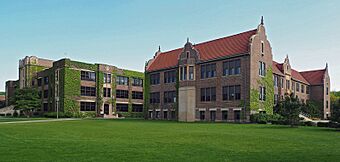
College Hall (left) and the Model School Building (right), now Somsen and Phelps Halls
|
|
| Location | 416 Washington Street and 151 W. Sanborn Street, Winona, Minnesota |
|---|---|
| Built | 1915 (Model School), 1924 (College Hall) |
| Architect | Clarence H. Johnston Sr. |
| Architectural style | Jacobethan (Model School), Collegiate Gothic (College Hall) |
| NRHP reference No. | 13000884 |
| Added to NRHP | December 3, 2013 |
Winona State University began as the First State Normal School. Its main goal was to train new elementary school teachers. In the 1850s, Minnesota was a new area, and there weren't enough trained teachers. A person named John Ford from Winona worked hard to get the Minnesota Legislature to create normal schools. He also helped raise over $5,000 from local people to start the first one. This school was also the first tax-funded school west of the Mississippi River.
Classes at Winona Normal School started in September 1860. However, many male students and staff left the next year to fight in the American Civil War. The school had to close in March 1862 because of the war. It closed again for two more years due to the Sioux War of 1862. The first group of students graduated in 1866.
The school soon added a "laboratory school." This was a place where local children were taught by the university's teachers. The university students could watch or even lead some lessons. The normal school quickly became too big for its first four-room building. But with state money and local donations, a new, bigger building was built in 1869.
The campus grew with new parts added to "Old Main" in 1894. A building for the library, gym, and kindergarten (Ogden Hall) was built in 1909. A dorm for women (Morey Hall) was added in 1910. In 1915, a new building was made for the laboratory school. Another women's dorm, Shepard Hall, appeared in 1920.
Winona State Normal School changed its name to Winona Teachers College in 1921. It was then allowed to give out a four-year Bachelor of Education degree. In December 1922, a fire completely destroyed Old Main. Luckily, no one was hurt because it happened during a school break. Local buildings and churches let the college use their spaces for classes. A new main building, College Hall, was built in 1924.
The 1915 Model School Building (now Phelps Hall) and the 1924 College Hall (now Somsen Hall) are important. They were added to the National Register of Historic Places in 2013. They show how the "normal school" idea helped shape public education in Minnesota. Winona Normal School was Minnesota's first teacher training school. It also had the first laboratory school, and it operated from 1860 to 1971. The student newspaper has been called The Winonan since 1922.
University Name Changes Over Time
- First State Normal School of Minnesota (1858)
- Winona Normal School (1873)
- Winona State Teachers' College (1921)
- Winona State College (1957)
- Winona State University (1975)
What Students Learn at Winona State
| Forbes | RNP |
|---|---|
Winona State University offers 65 different programs for undergraduate students. It also has 12 programs for students who want to continue their studies after their first degree. Winona State was one of the first universities to have a "Laptop University" program. This program is now called the e-Warrior Digital Life and Learning Program. In this program, every student gets to lease a laptop from the university. They can choose between an Apple Macintosh or a Microsoft Windows-based laptop.
In 2013, Winona State University became the first public university in the Midwest to give a tablet and a laptop to all students. The goal of this program is to connect education and technology even more closely. Each student at Winona State University pays a small fee per credit. This money helps fund the Minnesota State University Student Association. This is a group led by students that helps all students in the Minnesota state university system.
Learning with Students from Around the World
The International Services Office is the first place international students go for help. Winona State University also offers scholarships to students from other countries.
Winona State University has made many connections with colleges and universities worldwide. These "sister schools" include Tamkang University in Taiwan, Hebei University of Technology in Mainland China, Akita University, Tokyo International University, Toyo University in Japan, Soonchunhyang University, Chung-Ang University in South Korea. They also have connections with universities in Malaysia, Mexico, Spain, Egypt, Hong Kong, and Australia.
Winona State Buildings and Places
Where Students Live: On-Campus Housing
Winona State University has places for students to live right on its main campus in Winona. You can find more details about housing and dining on their website. Some buildings (Lourdes Hall, Tau Center, and Maria Hall) used to be part of a "West Campus." Students lived there until 2021.
Kirkland Hall and Haake Hall
These two buildings opened in 2010. They are next to each other and look like mirror images. This complex has 106 units, and each unit is for students of the same gender.
Prentiss-Lucas Hall
Prentiss-Lucas Hall (often called P-L) is one of the dorms for first-year students. Its two sides are mirror images, with Prentiss for men and Lucas for women. They are connected by a shared lobby. This hall closed in spring 2019 but reopened in fall 2020. It was used for single-occupancy rooms because of COVID-19.
The Quad Residence Halls
The Quad has four dorms that form a square: Conway, Richards, Morey, and Shepard. These halls have many lounges and house over 500 students. Conway Hall has four floors, with some floors for women, some for men, and some for all genders. Morey and Shepard Halls are connected in an "L" shape. Students are divided by floor in Morey-Shepard. Richards Hall is also co-ed, with men on the first and third floors and women on the second and fourth. Morey Hall is the oldest dorm on campus, finished in 1911.
Sheehan Hall
Sheehan Hall was built in 1969. It is a 14-story building that used to be only for women. Now, it is co-ed and houses most first-year students. The second through 13th floors are for living. The first floor has a lobby and a social area with a full kitchen.
Sustainability House
The Sustainability House was updated in 2011–2012. This house is used for a group of U.S. military veterans and other students if needed.
East Lake Apartments
East Lake was built in 2002-03 and opened in 2004. It is an apartment complex for both men and women. East Lake usually houses older students. Students living here do not have to buy a meal plan, but they can get a "block meal" plan if they want.
Important Academic and Sports Facilities
- KQAL: This is Winona State's own radio station.
- Krueger Library: The university's main library.
- Maxwell Field at Warrior Stadium: This is where the Winona State Warriors football and soccer teams play.
- Kryzsko Commons: This is the main student center on campus.
- WSU's Performing Arts Center: This building is home to the theatre arts, dance, and music departments. It also hosts the Great River Shakespeare Festival.
- The Integrated Wellness Complex: This building brings together counseling, health services, academics, and sports activities.
- Warrior Hub: This is where students go for academic services. These include financial aid, registration, advising, and career help.
Winona State Sports Teams
Winona State University competes in NCAA Division II sports. Their teams are known as the Warriors. They are part of the Northern Sun Intercollegiate Conference for most sports. However, the women's gymnastics team competes in the Wisconsin Intercollegiate Athletic Conference.
The school won its first national championship in 1985. The gymnastics team won the National Association of Intercollegiate Athletics (NAIA) title. They had four individual champions and many All-American honors. Their coach was named National Coach of the Year. That same year, the gymnastics team also competed in the NCAA Division II nationals. They earned a third-place trophy, which was a first for Winona State. The Warriors won the NAIA national title again in 1987. This time, they had one individual champion and seven All-American honors. Two gymnasts were also named Academic All-Americans for their great school achievements. The National Coach of the Year award went to Winona State University's head coach again.
Famous People Who Went to Winona State
- Ali al-Ahmed, a scholar from Saudi Arabia
- Austin Aries, a professional wrestler
- J.D. Barnett, a college basketball coach
- Karla Bigham, a state senator
- John Blatnik, a member of the U.S. Congress
- Josh Braaten, an actor
- David Braun, a college football coach
- Tom Brown, a college basketball coach
- Logan Clark, a wrestler
- Kyle and Lane Carlson, models
- Gregory Davids, a member of the Minnesota House of Representatives
- Dick Day, a state senator
- Mary Olstine Graham, an educator
- Jennie Ellis Keysor, an educator and writer
- Austin W. Lord, an architect, painter, and university leader
- Troy Merritt, a professional golfer
- Patricia Neder, an Olympic handball player
- Gene Pelowski, a member of the Minnesota House of Representatives
- Tim Penny, a member of the U.S. Congress
- Jeanne Poppe, a member of the Minnesota House of Representatives
- Jake Runestad, a composer and conductor
- Jerry Seeman, a professional football official
- Verner Suomi, known as the father of satellite meteorology
- Brian Wrobel, a professional football player
- James J. Mingus, a four-star Army General Officer
- Randall Herbst, a college basketball coach
See also
- List of colleges and universities in Minnesota
- National Register of Historic Places listings in Winona County, Minnesota
 | Roy Wilkins |
 | John Lewis |
 | Linda Carol Brown |




